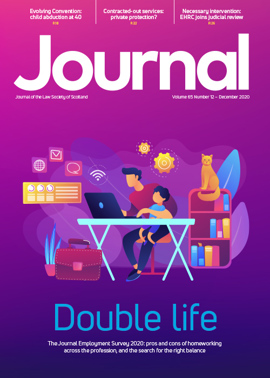The Eternal Optimist: Taking on the inner critic
Welcome back to my little corner of the Journal. If any of the topics that I cover resonate with you, or there is a particular issue you’d like raised, please contact me.
I do a little teaching on the Diploma and on Trainee CPD courses, mainly on “soft” skills as you may have seen me write about over recent years. In addition to the joys of working with young bright minds, it is a constant reminder to me of the issues we all face in our working days, and a source of reflection on my own multiple shortcomings. Two of those issues came to my mind recently.
Silence your inner critic!
All of us have a little voice in our head. It’s the one that tells us we aren’t doing it right; it could have been better, or simply that we maybe aren’t good enough. The critic is not fair. Its comments aren’t based on fact or evidence. They are just the echoes of our fears and uncertainties. For some of us the voice is louder, for others an occasional whisper, but we all live with our inner critic’s mutterings. Mine, I suspect, are a bit on the loud side, but what seems unfair is that my inner supporter is unusually quiet.
I’m human, ergo I make my mistakes. Hopefully they are seldom and of minimal impact, but I do give myself a hard time about them as I’m sure most of you do about yours. I have however also successfully accomplished many things and yet seldom dwell on them. Indeed I usually skip quickly past them when they happen, and worse, I too often shy away from praise or congratulations when offered, with the usual “It was nothing.” While I’m quite happy with my position on the latter, I often ask myself, “How do I get rid of the former?”
That question has been the subject of many books, but here are a couple of suggestions that I try to focus on:
Be aware of the inner critic, and listen for it, not to it. The inner critic has nothing good or constructive to say. Either ignore it, or imagine it coming from a ridiculous or comical figure to reduce its impact.
Reflect when you can on all the things that you have done and continue to do well. In particular, when someone pays you a compliment, just say “Thank you; that was kind.”
On a similar note, perhaps it’s worth always remembering the struggles of others and how important it is to pay them a compliment when you can.
Be your own verifier
A little like our critics, there are those of us who are internal and those who are external verifiers. For example, my wife is the ultimate external verifier. When it comes to making decisions she will usually seek the opinion of those around her before a choice can be made. It is neither a good nor a bad characteristic (although it can be frustrating).
I suspect that most in the profession will tend towards the internal verifiers. We have to make lots of decisions in our day and it simply wouldn’t be practical for us to seek external support for all of them. That doesn’t though mean that we don’t at times require a little external verification, and many of those around us in our firms, including our clients, certainly do.
Again, as with critics, half the battle is just being aware. Whether it’s speaking with clients, trainees or staff, remember that if they sometimes need you to give them support in their decision making, that isn’t always ignorance or reluctance: sometimes it’s just a bit of verification. Conversely, with those who are good internal verifiers, leave them alone unless they clearly are asking for help.
Regulars
Perspectives
Features
Briefings
- Jury still out on verdicts
- Corporate: My turn(over) or yours? Or theirs…
- Intellectual property: Key role against climate change
- Agriculture: A right less exercised
- Sport: Widening the contract safety net
- Property: Only "part of" the story
- Property: Barony Register in new hands
- In-house: Use your experience







